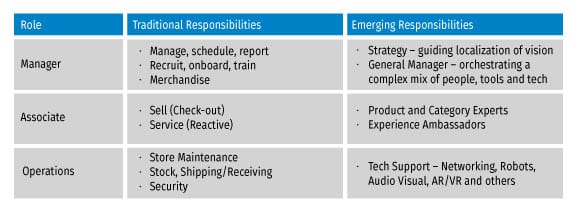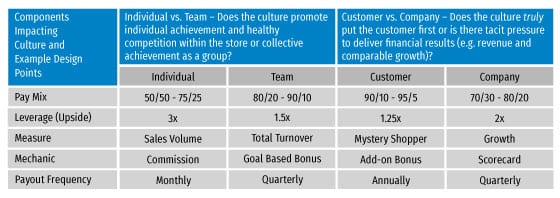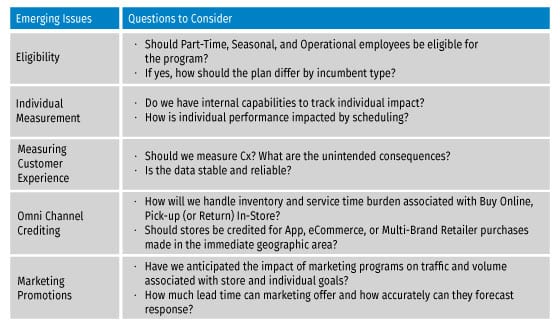Four Retail Sales Compensation Imperatives for 2020

Set your stakeholders up for success with four retail sales actions.
The 2020s will provoke change in the world of retail. Digital transformation will continue to disrupt, customer experiences will become more personal and only those retailers that keep pace will survive.
Retail leaders are racing to adapt their store operations to win in this new world. The purpose of the brick and mortar location is shifting, retailers are launching new formats and asking employees within the store to execute new and different tasks.
Sales compensation is a powerful management lever helping companies navigate these exciting but unpredictable times. A properly calibrated program will build a groundswell of support from the in-store team and serve as a daily reminder of the retailer’s vision. However, improperly tuned programs will slow the pace of change.
Program owners are responsible for arming their Retail leaders with plans that align with store strategy, reinforce job intent, nurture culture and flex to meet the unique needs of an increasingly complex ecosystem. Those who act on these imperatives set their stakeholders up for success.
The Retail Sales Compensation Program Owner Call to Action:
IMPERATIVE #1 – Align Plans With Store Strategy
Program owners must understand how the retail store fits into overall brand and growth strategy. The purpose of the brick and mortar location is the gateway to ensure incentive programs motivate the needed in-store execution. Owners should conduct a series of leadership interviews with Retail and Retail Operations leadership across geographies to understand the role of the store. These answers–often sales, service or hybrid–will begin to direct how the program should change to serve the needs of the store.
Sales – Stakeholders communicate the primary purpose of the store is in-market distribution. The brand, marketing and physical location drive demand and traffic. The store staff’s responsibility is to convert traffic to turnover. The incentive plan for this strategy features greater pay at risk, individual volume metrics and weekly or monthly payouts.
Service – Stakeholders communicate the primary purpose of the store is to deliver a differentiated service experience that draws the customer closer to the brand. The store manager is responsible for orchestrating a symphony of team members and each associate must execute their role flawlessly. The incentive plan for this strategy features moderate pay at risk, a balance of individual and team performance metrics and a monthly or quarterly payout.
Hybrid – Stakeholders communicate the store is an integral part of an omnichannel strategy. The store is a point of distribution for some customers and an experience for others. Team members must perform to turnover, operational and customer experience goals. The incentive plan for this strategy features moderate pay at risk and team measures paid quarterly used to mitigate risk of any one individual polluting the delicate omni-ecosystem.
IMPERATIVE #2 – Ensure Plans Reinforce Job Intent
The purpose of the retail store is dramatically changing. Consequently, management, sales associate and operations roles execute differently than they did yesterday. The manager is accountable for a wide array of turnover and quality metrics. The sales associate delivers an experience versus a sale. The operations team keeps automated checkout working properly. Program owners must keep their fingers on the pulse of how their stakeholders expect in-store jobs to execute. New job responsibilities will directly impact the measures that might appear in their sales compensation plan.
Leadership can gather high quality insights via a web-based feedback survey that includes collecting data about how time is spent or a series of interviews with regional directors and store managers. Additionally, seeing is believing–spend time in market observing behaviors to crystallize survey and interview findings.
IMPERATIVE #3 – Design Plans That Nurture Culture
The choices program owners make can have a profound impact on in-store culture. Nurture a team culture through moderate pay at risk and upside accompanied by store level measures and less frequent incentive payouts. Drive action and accountability through greater pay at risk and upside along with individual measures and more frequent payouts.
The same survey- and interview-based research used for the required insights to address Imperative #2 fits here. Complement that research with insights from HR and Learning and Development organizations. Capture an understanding of the type of talent being targeted for in-store roles and understand their value drivers. Include reflective feedback sessions as part of your design process and test whether the design inhibits or enables desired in-store culture.
IMPERATIVE #4 – Operate an Agile and Adaptable Program
At the close of the decade, the brick and mortar store is likely to look dramatically different than it does today. Retail leaders will remain agile in an effort to capitalize on new digital capabilities and stay ahead of consumer preferences. Like their stakeholders, plan owners too must remain agile.
Programs require global governance and guidelines to maintain order and dissemination of leading practices. However, a rigid one-size-fits-all model will not service the business. Plan owners should offer their stakeholders a set of guiding principles and a menu of choices in the form a Global Sales Compensation Design Framework. This tool guides plan localization within a defined set of rules.
Sidebar: What is a Global Sales Compensation Design Framework?
A set of guiding principles and rules governing associated plans. Best-in-class frameworks disseminate leading practices while delivering the right degree of flexibility to serve local market needs. They include principled statements providing overarching direction. They offer a menu of options or rules by design component (e.g., eligibility, pay levels, pay mix, leverage, measures, mechanics, pay and performance periods, and others). The framework is owned by a center of excellence or Total Rewards (Compensation and Benefits). Owners collaborate annually with local market teams to support design processes and ensure the resulting plans meet internal standards.
An additional byproduct of the changing retail environment is a host of new sales compensation design issues. Plan owners must anticipate these issues and incorporate new rules and policies into the program. The program terms and conditions also must remain adaptable to address in-year issues as they arise.

Plan owners that respond to Alexander Group’s Four Retail Sales Compensation Imperatives call to action will better enable their stakeholders to bring store strategy to life by reinforcing job intent. Their programs will effectively nurture culture delivering sustained execution. Finally, they will manage agile and adaptable programs that serve the business in an exciting time of change.
Learn more about how Alexander Group can help.